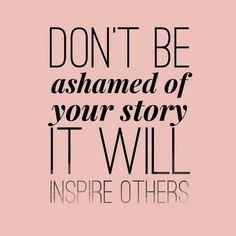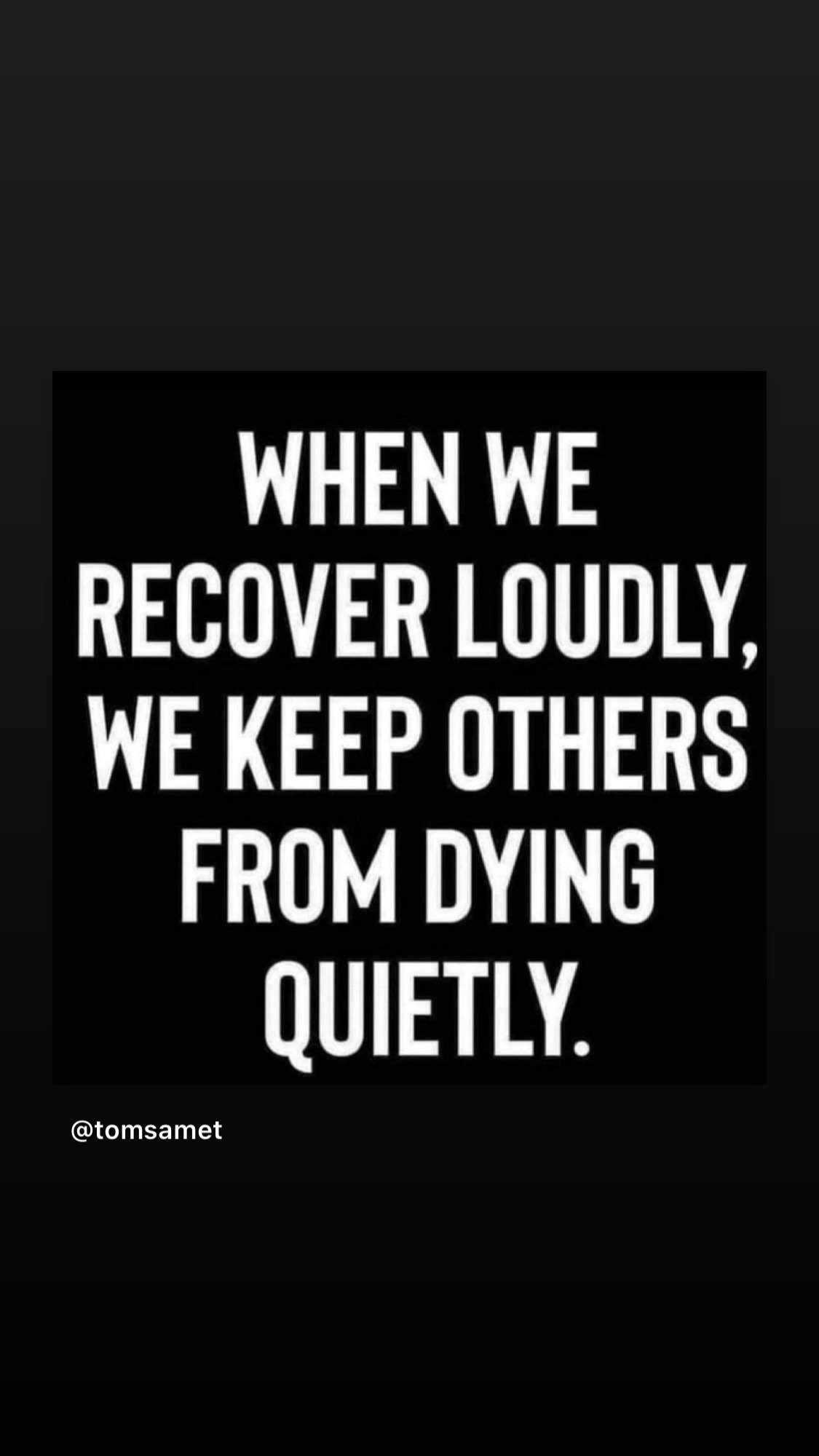Tell Your Story, Share Your Struggle
In James 5, the author instructs the Church to “confess your faults one to another, and pray one for another, that ye may be healed.” What this means isn’t a public confession of all your sins and shortcomings, or a recitation of faults to an intermediary to receive forgiveness; rather, this is an invitation to reconcile with those whom you have sinned against. A public sin should be confessed publicly; private sins should be confessed to those hurt by them.
In the era of social media, we see the very best of people - carefully curated photos and posts about the highlights of their lives, and the dark struggles are often hidden and obscured so that no one thinks less of them. And the rest of us compare their highlight reel to the shortcomings and flaws in our lives. Too often, we only see what people want us to see, and we don’t realize, perhaps, that they’re doing everything they can just to keep their heads above water.
Everyone struggles. That’s simply a fact of life. There’s nothing to do about it - to paraphrase John 16:33, “in this world you will struggle.” But Jesus goes on to say, “I have overcome the world.” Through Jesus, we can overcome any obstacle - there are about a million coffee cups and refrigerator magnets with verses to remind us of this fact.
But what do we remember in the dark moments? In the midst of a struggle, how quickly do we recall the coffee-cup wisdom? Maybe the encouraging cup of coffee is enough, but if statistics about suicide, depression, and other mental health disorders are right, there’s a need for more. Too often, people struggle in silence because in addition to whatever weight or burden they’re carrying, they believe that they’re alone, no one cares or understands, and the shame and fear keep them from reaching out and asking for a hand.
In his inestimable work The Great Divorce, CS Lewis tells a story of Purgatory, Heaven, and Hell, and the souls who can choose Heaven, but have to overcome some personal flaw or sin to receive it. It’s a fabulous tale, and one that should be read and reread every year. In chapter 8, he shares the account of a woman who isn’t ready in her current condition for Heaven, and is reticent to proceed despite the angel telling her that the journey will prepare her:
“How can I go out like this among a lot people with real solid bodies? It’s far worse than going out with nothing on would have been on Earth. Have everyone staring through me.”
“Oh, I see. But we were all a bit ghostly when we first arrived, you know. That’ll wear off. Just come out and try.”
“But they’ll see me.”
“What does it matter if they do?”
“I’d rather die.”
“But you’ve died already. There’s no good trying to go back to that.”
“But, I tell you, they’ll see me.”
“An hour hence and you will not care. A day hence and you will laugh at it. Don’t you remember on earth — there were things too hot to touch with your finger but you could trim them all right? Shame is like that. If you will accept it — if you will drink the cup to the bottom — you will find it very nourishing: but try to do anything else with it and it scalds.”
The character here is too consumed by her own condition and what others may think of her to accept that she can transform - or, more appropriately, be transformed - to receive what is being offered to her. She can’t receive salvation because she’s too bound by the pain and shame of her brokenness. The soul offering her the guidance and support to get her there can’t persuade her to take help and, in the end, chooses Hell.
I’m blessed - I have friends who know my struggles, who have been there for me through it all, who I can reach out to when I struggle and help me get through the difficult times. I’m a much happier, more stable, more balanced person than I was a decade ago. But I know too many people who can’t say that in their lives. For this reason, I want to begin to share my story.
I am an alcoholic - I’ve been sober since October 2015. I struggle with depression. In 2004, I stood on a bridge contemplating suicide. For years after, I struggled with depression and suicidal ideation. There were times that I had to reach out to someone to get help - I have a therapist, I’ve taken anti-depressants when needed, and I’ve even taken all the guns out of the house and had a trusted friend hold them because I was worried what I would do to myself. For a long time, even when I wasn’t actively suicidal, I assumed that when I died, it would be because I took my own life. I’ve struggled with the darkness and hopelessness that comes from that sort of thing.
Thankfully, I’m in a much better place now. I’ve made changes in my life to help keep me from going to a dark place. I’ve worked with my therapist to identify my emotional triggers and I’ve learned what it looks like when I start to get depressed and found ways to cope and minimize the episodes, so that I don’t travel again down the path to depression, hopelessness, and despair. But it wasn’t an easy road - I had to learn to be open and vulnerable with people and, as the woman in Lewis’ tale said, to let them see me. But here’s what I’ve found - in my weakest, darkest moments, when I’ve reached out to one of my friends, to my wife, or to my family and talked about what I’m struggling with, they’ve stepped up. They’ve listened. They’ve loved me, prayed for me, encouraged me, and followed up with me. And by openly talking about the thing I was struggling with, by putting it out in the light instead of letting it fester in darkness, I’ve taken away the power of it.
I don’t remember where I first heard the quote, but an old Swedish proverb has proven true time and again in my life.
Joy shared is joy doubled. Sorrow shared is sorrow divided.
I want to encourage you, if you’re struggling with something, be it a besetting sin, or a mental illness, or just something in your life that holds you back - find a friend to share it with. Talk about it. Pray about it together. Be open about what you’re struggling with and break the cycle of shame and secrecy, and find ways to move through your trial.
Secondly, though, I want to offer another encouragement - if you’re someone who has been through a struggle, share your story. I don’t talk about battling alcoholism or depression to make myself look good, but rather to say this - if you’re struggling with something like this and you want help, or just need someone to talk to who will understand, listen, love you, and not judge you, you can reach out to me. I wouldn’t be alive today if it weren’t for my family and my friends who took my calls, listened to me complain and struggle, called me out when I needed it, and encouraged me when I was down. God put them in my life to help me heal, and He did that so that I could help other people heal.
In Aaron Sorkin’s The West Wing, one of the main characters, Josh Lyman, was struggling with PTSD. His boss and mentor, Leo McGarry, identified the symptoms and helped him get help. When Josh asked why, Leo shared a story.
This guy’s walking down the street when he falls in a hole. The walls are so steep he can’t get out.
A doctor passes by and the guy shouts up, “Hey you! Can you help me out?” The doctor writes a prescription, throws it down the hole and moves on.
Then a priest comes a long and the guy shouts up, “Father, I’m down in this hole, can you help me out?” The priest writes out a prayer, throws it down the hole and moves on.
Then a friend walks by. “Hey, Joe, it’s me can you help me out?” And the friend jumps in the hole. Our guy says, “Are you stupid? Now we’re both down here.” The friend says, “Yeah, but I’ve been down here before and I know the way out.”
I’ve been down the hole. I want to help. Some people have had different struggles, they have a different story to tell, and they can offer help that I can’t. My friend Stephanie has been chronicling her story of depression, anxiety, and an eating disorder over at her blog, and I encourage you to read it. It’s powerful.
One last thing - your story isn’t over yet. It’s being written every day, and it’s a beautiful tale. So tell your story, share your struggle, and testify about what God has done in your life, because your story is going to encourage someone else who felt like there was no way out for them. But you know the way out, so share that light for others.




